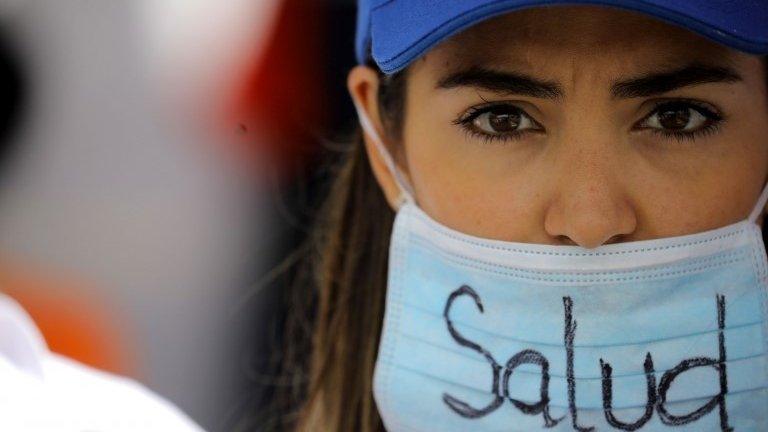Venezuela crisis: Guaidó hints at 'amnesty' for Maduro
- Published
Who's really in charge in Venezuela? The BBC's Paul Adams explains
Venezuelan opposition leader Juan Guaidó has said he would consider an amnesty for President Nicolás Maduro if he cedes power.
Mr Guaidó, who declared himself interim president on Wednesday, said he was reaching out to all sectors including the military to end the crisis.
Mr Maduro began a second term after polls marred by an opposition boycott and vote-rigging claims.
The global community is split on whether to recognise his government.
But so far, Mr Maduro retains the crucial support of Venezuela's military.
Who is backing whom?
The US, more than a dozen Latin American countries, Canada and the UK have backed Mr Guaidó - who is leader of Venezuela's elected National Congress - after he said he was the legitimate president.
But Russia has condemned foreign support for Mr Guaidó, saying it violates international law and is a "direct path to bloodshed".
According to Reuters, Russian military contractors have been flown secretly into the country to provide security for Mr Maduro, external.
China, Mexico and Turkey have also publicly backed his regime.

Venezuela's upheaval explained
Are you in Venezuela? Email your story to haveyoursay@bbc.co.uk, external

US Secretary of State Mike Pompeo has requested a UN Security Council meeting on the issue on Saturday.
At a meeting of the Organization of American States (OAS) on Thursday, he described Mr Maduro's government as "morally bankrupt" and "undemocratic to the core".
The Trump administration is working on a plan to funnel funds to Mr Guaidó, who is currently at an undisclosed location.
UN human rights chief Michelle Bachelet raised fears on Friday that the situation "may rapidly spiral out of control, with catastrophic consequences", and called for an independent investigation into claims that Venezuela's security forces used excessive force against protesters this week.
What did Guaidó say?
Mr Guaidó and his allies accuse Mr Maduro of usurping power through a fraudulent election.
"Our challenge is to secure free elections, and we want them as soon as possible. But we are living in a dictatorship," Mr Guaidó told US Spanish-language TV station Univision.
He previously told the Financial Times: "No one wants to live like this, whatever their politics: people going five or six months without running water in their houses, without medicines, without enough money to buy food."
Discussing a possible amnesty for Mr Maduro, Mr Guaidó said a similar move had played a role in Chile's democratic transition.
"These amnesties are on the table for all those who are ready to... restore the constitutional order," he said.
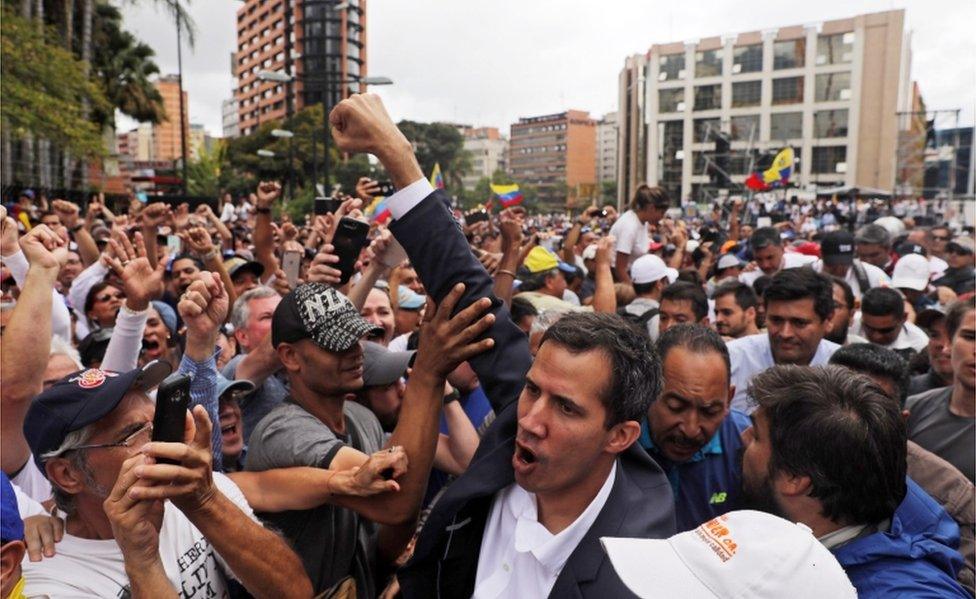
Mr Guaido (C) is offering an amnesty for Venezuela's military and civilian leaders
He has previously said articles within the country's constitution allow him to assume power temporarily because the election was a sham.
How did the row develop?
Large protests were organised against Mr Maduro on Wednesday - as well as some in support of him.
At one demonstration in Caracas, Mr Guaidó declared himself the country's acting president.
Within minutes, Mr Trump recognised Mr Guaidó as Venezuela's legitimate head of state. A number of South American nations, as well as Canada and the UK, followed suit.
Thousands attended a rally in Caracas on Wednesday against President Maduro
Mr Maduro has labelled the US comments a "big provocation" and broken off diplomatic relations.
On Thursday, he ordered the closure of Venezuela's embassy and consulates in the US. However Mr Guaidó has urged Venezuelan diplomats in the US to remain at their posts.
The US state department has ordered non-essential staff to leave Venezuela.
A Caracas-based NGO, the Observatory of Social Conflict, says that at least 26 people have been killed in demonstrations so far this week.

What could Mr Trump do next?
Analysis by Natalie Sherman, BBC News Business Reporter
The US has already imposed a raft of sanctions in the past two years, which target officials in the Maduro government, restrict Venezuela's access to US debt markets and block dealings with those involved in the country's gold trade.
But so far, the Trump administration has not taken action directly against oil imports, which are a key source of cash.
A stand-off over US embassy personnel could push the White House to take that step.
But analysts cautioned that oil sanctions would likely have limited effect on the Maduro regime, which could redirect shipments to allies such as China and Russia, while blaming the US for any additional hardship.

Why are people protesting?
Mr Maduro has led the country since 2013 and was sworn in for a second term earlier this month. His main opponents were banned from running in the presidential vote.
Despite having the world's largest proven oil reserves, Venezuela's economy has been in a state of collapse for several years.
Its industry has suffered mismanagement and oil revenue has dropped significantly.
Corruption allegations have also been made. In November, a US court sentenced the former head of Venezuela's treasury, Alejandro Andrade, to 10 years in prison for money laundering.
What drives someone to cross South America on foot?
The president has faced internal opposition and ongoing international criticism for his human rights record.
Hyperinflation and shortages of food and medicine have hit the population hard, causing millions of Venezuelans to flee.
Strategic partners including China and Russia have invested deeply the country's ailing economy - ploughing billions into trade deals and loans.
Moscow sees Venezuela as one of its closest allies in the region.
- Published24 January 2019
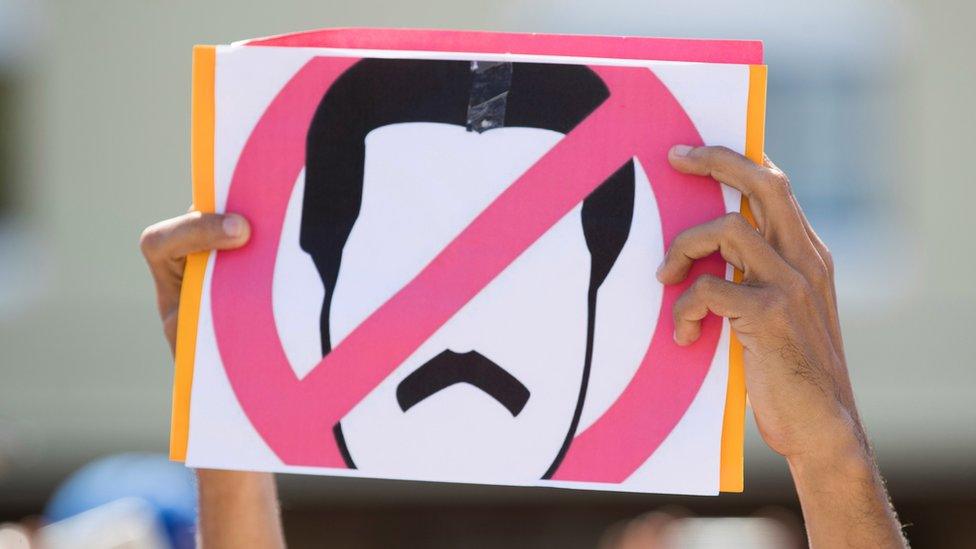
- Published23 January 2020

- Published12 August 2021
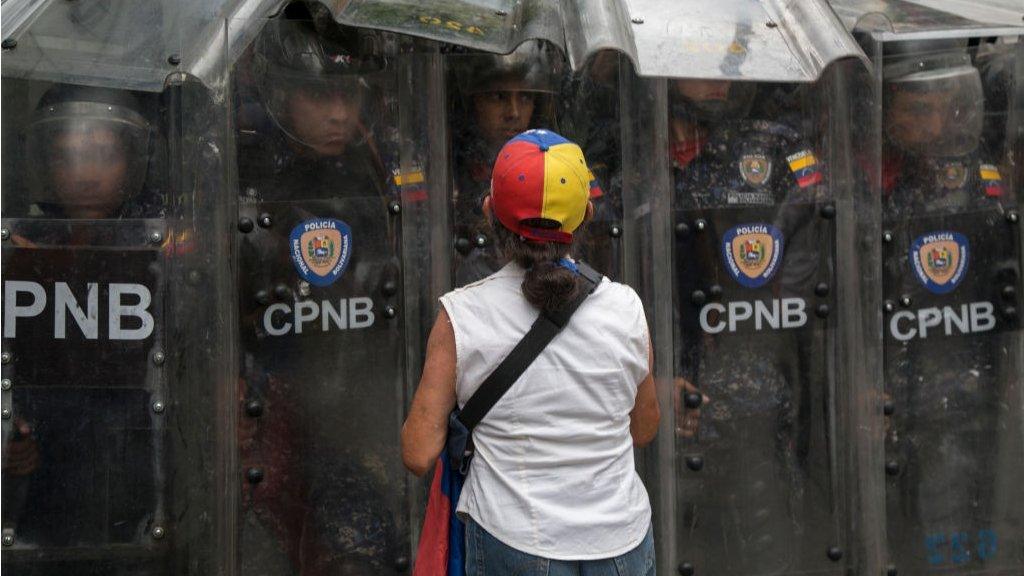
- Published30 December 2018
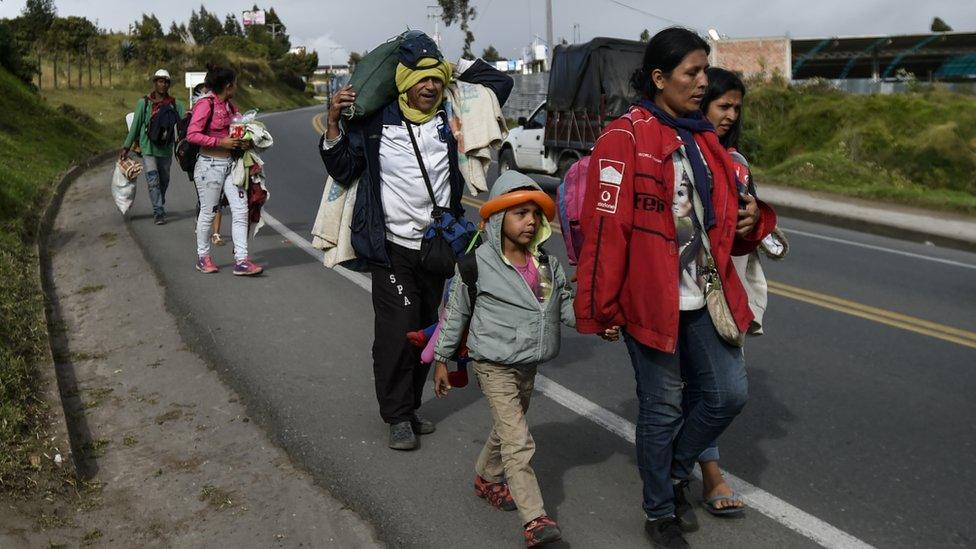
- Published10 August 2017
